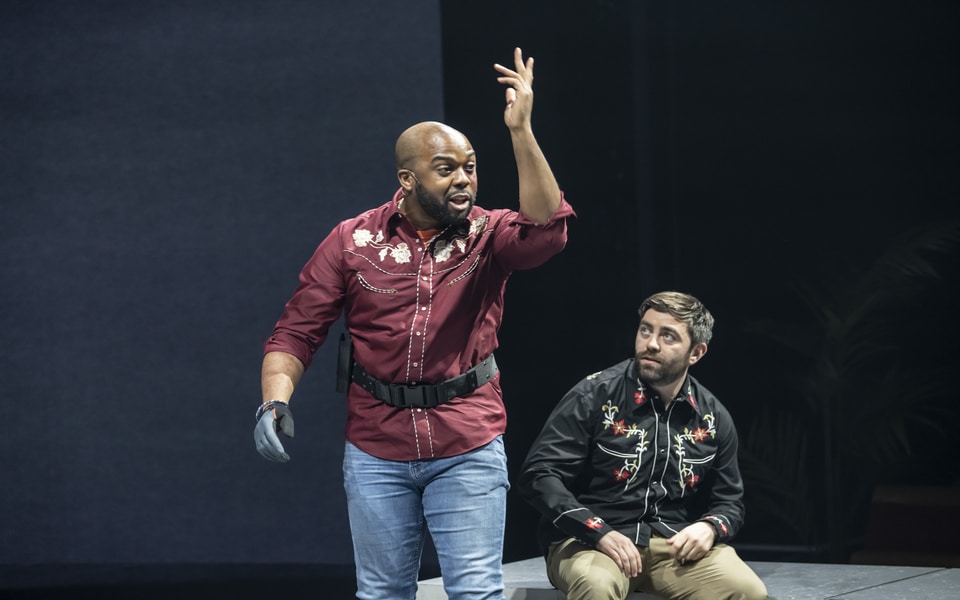White Noise, Bridge Theatre review: A provocative take on racism in America

White Noise, Suzan-Lori Parks’ explosive play on race in twenty-first century America, is as much about the problem of silence in the face of injustice as it is about performative solidarity. The play centres on four thirty-somethings: Leo (Ken Nwosu), a black artist, his white lawyer girlfriend Dawn (Helena Wilson), and their old college friends, interracial couple Misha (Faith Omole) and Ralph (James Corrigan). Initially the play looks set to be a smart takedown of the desires and misadventures of overeducated young liberals. The characters work cushy jobs and inhabit an unspecified American city while chasing dreams, debating ‘wokeness’, and trying to shirk the cliches of their respective privileges.
Leo is an insomniac, the static fuzz of white noise the only thing he has found to help. In the first scene he is nursing a large bruise on his cheek – the result of a racially-motivated assault by a police officer during one of his nighttime walks. His girlfriend suggests he press charges, but Leo, who insists that “I am not a victim”, has another idea.
Enlisting the help of his friend, a trust-fund boy turned college professor known by his faculty as “Righteous Ralph” – played by Corrigan with a brilliantly menacing energy reminiscent of Oliver Reed – he becomes an indentured slave for 40 days; Ralph, his master. The idea is part performance art, part social experiment – and just as the Stanford Prison Experiment revealed the corrupting effects of power, we watch as Ralph increasingly absorbs, or perhaps reveals, the “straight white guy” supremacist he had hitherto suppressed.

Through this central premise the play confronts the legacies of colonialism, the realities of ‘white guilt’ and ‘black pessimism’, cultural appropriation, and systemic racism, the situations lurching from hyper-realism to the absurd. Written in 2016, the text contains tremors of election anxiety, and remains deeply foreboding; five years on, with the murder of George Floyd, and the rise of the BLM movement, its themes continue to strike a chord.
A clever four-hander, the characters represent the ideologies and fears of maturing millennials. Faith Omole’s Misha is a vlogger running an “Ask a Black” daily streaming service that allows callers to ask questions about race they wouldn’t normally dare. This is Parks needling the audience with their own racial misconceptions, the resultant montage-effect proving greatly comical, and adding welcome levity. Ken Nwosu conveys the acute exhaustion of his character who both aspires to break into the art world, and despises its hypocrisies, completing an incredible emotional arc by the last act. Helena Wilson, meanwhile, is perfectly cast as Dawn, the ‘do-gooder’ trying to overcome her Waspy upbringing. Parks’ sharp observations deal in stereotypes without stereotyping, with monologues permitting each character ample chance to defend themselves. The group are convincing as friends and lovers, which makes the plot’s descent into absurdity all the more shocking.
Much of the action occurs on Ralph’s shooting range, where guns both real and metaphorical are routinely fired. Lizzie Clachan’s dynamic set hints at the characters’ changing dispositions without feeling too forced, while Polly Findlay’s subtle direction helps the scenes clip along at times when a play of nearly three hours in length might have lagged.
With this provocative piece of theatre, Parks shoots straight for bull’s eye.